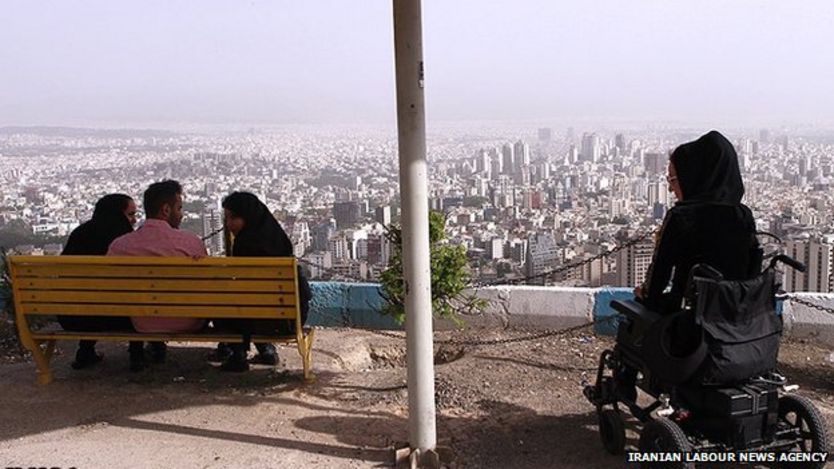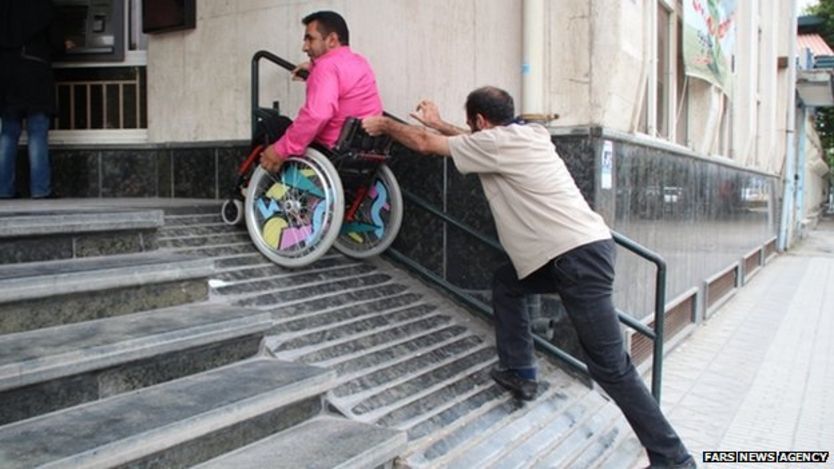- 29 August 2015
- From the section Middle East
"London
has completely changed my life," says 31-year old Marjan Kalanaki, a
post-graduate computer science student from Tehran who now lives in the
UK.
"Sometimes I can't believe how independent I have become and how easily I can get by on my own."Ten years ago, back in Iran, Marjan broke her back in an accident and now she relies on crutches and a mobility scooter to get around.
As she weaves in and out of the crowds on a busy London street, she reflects on how much harder it was for her to live with her disability back home in Iran.
"I used to wake up in the morning in Tehran thinking about what a huge challenge it was going to be trying to get somewhere, she tells BBC Persian.
"Some days I would tell myself that I'd be better off dead."
There are around three million people in Iran living with "acute" physical and mental disabilities, according to figures quoted by the country's Minister of Labour and Social Welfare Ali Rabiei in a speech in 2014.
Of these as many as 700,000 are under 25 and another 400,000 are veterans of the Iran-Iraq war in the 1980s.
But campaigners for disabled rights say the number of Iranians living with less severe disabilities could be as high as 10 million.
Uncommon sight
Despite the statistics it's still relatively uncommon to see people with disabilities out and about on the streets."I wrote my PhD thesis on understanding barriers to disabled accessibility," says Shireen, from Isfahan in central Iran, who called a BBC Persian phone-in programme on disability recently.
"I came to the conclusion that the biggest obstacle for disabled people in my city was steps and stairs."
In 2014 Iran signed up to the recomme ndations of a UN review of its disability provisions.
An official recently announced to the media that the state now pays 90% of university tuition fees for people with disabilities.
And many are benefitting from this.
Hadi, from West Azerbaijan province contacted the BBC to share his story.
He lost both hands and an eye at the age of 15 when he stepped on a land mine on the family farm.

"I had confined myself to home for eight years, he said.
"But then I realised that by becoming a recluse I was only promoting the patronising attitude of the public towards people like me."
But while progress is being made with higher education, there are still major concerns, which have been highlighted by the UN Children's Fund, UNICEF, about how few disabled children are going to primary school in Iran.
It's an issue only too familiar to Marjan, who has spent time in Iran volunteering with disabled children.
"In the UK, even a six or seven year-old knows how they should look at me. Because they already have disabled classmates at school," she says.
"In Iran, children with disabilities don't go to school!"
Jobs scarce
For those who do manage to get degrees the next problem is finding a job.The Iranian government says all organisations that receive state funding must hire 3% of their workforce from the disabled population.
But there are no statistics to indicate whether these quotas are fulfilled.
It is also not clear exactly how many disabled Iranians are currently in work.
Many complain that they are excluded by the general health tests carried out by employers.
Some estimate that unemployment rates for the disabled are three times higher than the national average, with as many as 40% out of work.
UN Convention on the Rights of Persons with Disabilities:
There are eight guiding principles that underline the Convention:- Respect for inherent dignity and individual autonomy including the freedom to make one's own choices and independence of persons
- Non-discrimination
- Full and effective participation and inclusion in society
- Respect for difference and acceptance of persons with disabilities as part of human diversity and humanity
- Equality of opportunity
- Accessibility
- Equality between men and women
- Respect for the evolving capacities of children with disabilities and respect for the right of children with disabilities to preserve their identities
But for people like Marjan, the biggest barrier of all is the lack of social acceptance.
"Iranians aren't used to seeing disabled people on the street and when they see them, they don't treat them well," she told the BBC.
People from traditional, conservative backgrounds, still see disability as a religious affliction that can be cured though prayer.
"One of the most upsetting things that could happen is the glances…People looking at you and saying 'May God restore your health and heal you'," says Marjan.
"These comments make you feel like the entire world is crashing down on your head."
But more Iranians are now prepared to speak out and challenge attitudes like this.
Iran now has more than 200 non-governmental organisations supporting disabled people and campaigning for their rights.
For Marjan it's a sign things are slowly beginning to change.

No comments:
Post a Comment